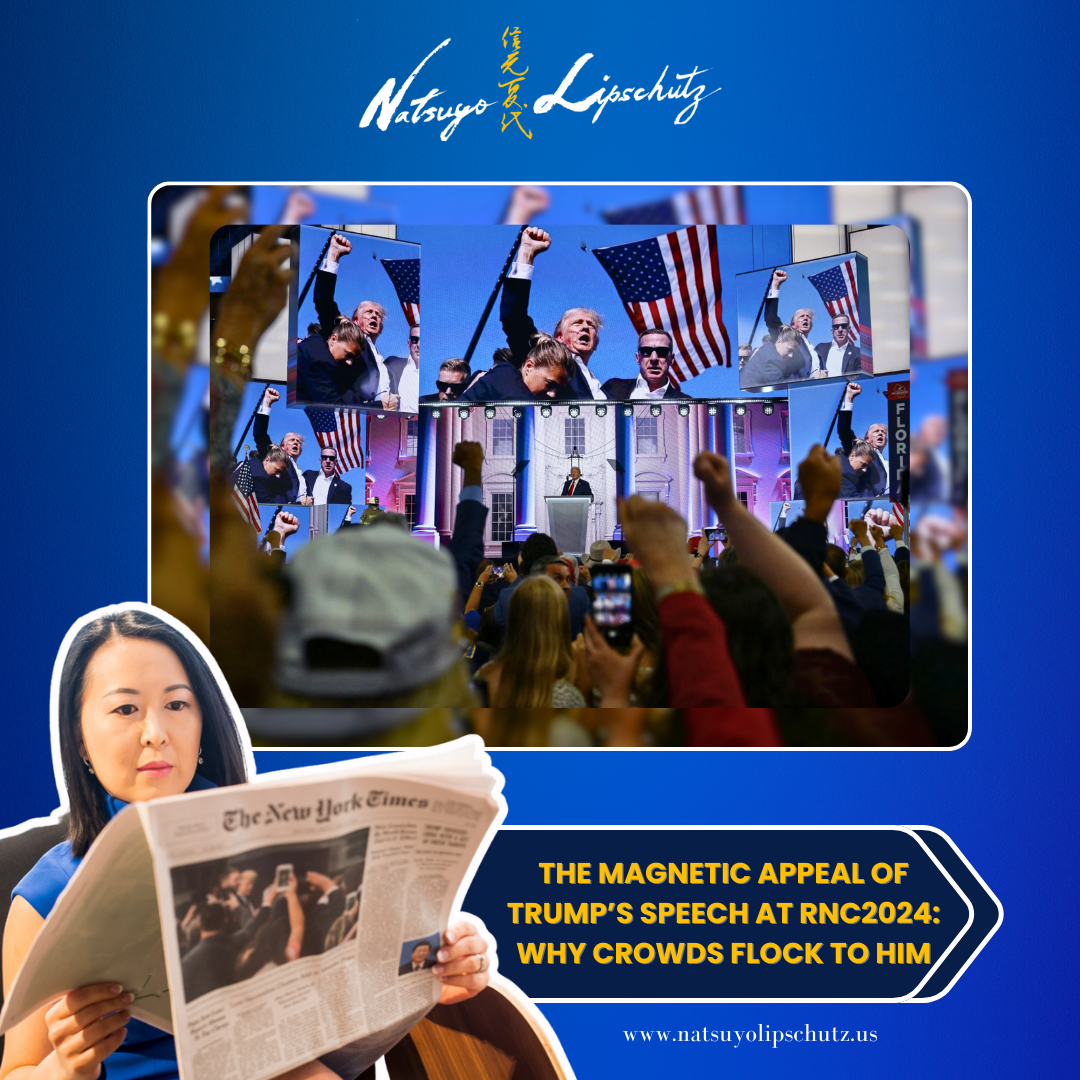
On July 18th, 2024, Trump delivered an unprecedented 93-minute acceptance speech at the Republican National Convention. While the latter half was his usual “Trumpism”, the first half employed an approach that had not been seen from Trump before. In this article, I’m unraveling Trump’s magnetic appeal as demonstrated in his acceptance speech. But first, let me clarify. This article is not to share my political views or take sides on a particular political party or a candidate, but I’m only focusing on analyzing his speech from a professional speaker’s point of view.
Consistent Lack of Logos Trump’s Magnetic Appeal
The ancient Greek philosopher Aristotle stated that “to persuade someone, three elements must be present: logos, pathos, and ethos.” These are known as the “Persuasion Triad.” Logos refers to logical appeal, pathos to emotional appeal, and ethos to ethical appeal.
For more information on the three elements of persuasion, please refer to this article (Japanese only):
Trump’s speeches consistently lack logos, and his recent acceptance speech was no exception.
For instance, he confidently claimed that a tariff of 100-200% would be imposed on cars produced in Mexico and China. However, he completely ignored the fact that tariffs lead to increased prices for imported goods, which might counteract efforts to curb inflation. He also asserted that he would immediately resolve the inflation crisis and lower interest rates, which excited the audience. In reality, however, oil prices are influenced by international markets, such as the situation in the Middle East, so one country leader’s action alone is unlikely to influence the inflation crisis.
Additionally, he declared that he would close the border on his first day in office to address illegal immigration. However, a potential concern is that a reduced number of immigrants could lead to a labor shortage, putting upward pressure on prices. Furthermore, he mentioned the Russian invasion of Ukraine and the conflict between Israel and the Islamic organization Hamas, claiming that if he were president, he could stop the wars with a single phone call. This is an unfounded bluff, as he provided no concrete path to ending these conflicts.
These are some of many examples that Trump consistently exhibits a tendency to lack logos, or logical coherence.
Despite this, why do the masses support Trump with a fervor akin to religious zeal?
In one word, it comes down to “pathos”—his emotional appeal is in full force. Let’s unravel this by examining specific elements of his recent speech at RNC2024.
Maximizing the Emotional Contrast in the Opening Act Trump’s Magnetic Appeal
The impression of a speech is significantly influenced even before it begins.
Before Trump took the stage, Dana White, CEO of Ultimate Fighting Championship, delivered a short speech introducing Trump. White emphasized his 25-year friendship with Trump and spoke about Trump’s thoughtful gestures towards him, thereby enhancing Trump’s trustworthiness and humane character, which is a part of building “ethos,” one of the three elements of the Persuasion Triad. Furthermore, White’s passionate delivery style not only established ethos but also heavily leaned into pathos, stirring emotions, energizing the audience, and building anticipation.
After White’s rousing introduction, one might have expected Trump to make his entrance. Instead, a band played a song, a nationalistic yet sentimental melody.
This is where an emotional contrast is created.
By heightening the audience’s emotions to their peak and then bringing them down with a sentimental melody, a contrast in emotions is maximized. This contrast forms a gap in the audience’s hearts. Once this gap is created, Trump can easily step right into their hearts and make his grand impact.
That’s exactly what happened.
The back of the stage opened, and Trump made a dramatic entrance. He seamlessly entered the emotional gap created in the audience’s hearts.
It was a masterful execution.
Penetrating the Deepest Part of the Heart with a Story Trump’s Magnetic Appeal
In his opening act, Trump completely sealed off his usual rhetoric. Just five days earlier, an assassination attempt on Trump had sent shockwaves across the nation.
Trump narrated the entire incident with an emotionally calm voice, which is very unusual for him.
It was a warm, beautiful day in the early evening in Butler Township in the great Commonwealth of Pennsylvania. Music was loudly playing and the campaign was doing really well. I went to the stage and the crowd was cheering wildly. Everybody was happy. I began speaking very strongly, powerfully and happily because I was discussing the great job my administration did on immigration at the southern border. We were very proud of it.
Behind me and to the right was a large screen that was displaying a chart of border crossings under my leadership. The numbers were absolutely amazing. In order to see the chart, I started to, like this, turned to my right and was ready to begin — a little bit further turn, which I’m very lucky I didn’t do when I heard a loud whizzing sound and felt something hit me really, really hard on my right ear.
I said to myself, wow, what was that?
This story brilliantly portrays the “Circumstance” and “Character” from my “6C’s of Strategic Storytelling(™)”, without spending too much time before introducing the “Conflict.”
For more on the 6 Cs, please refer to this article (Japanese only):
Trump further heightened the tension just after the bullet grazed his ear.
Bullets were continuing to fly as very brave Secret Service agents rushed to the stage, and they really did. They rushed to the stage. These are great people at great risk, I will tell you. And pounced on top of me so that I would be protected. There was blood pouring everywhere, and yet in a certain way I felt very safe because I had God on my side. I felt that.
The amazing thing is that prior to the shot, if I had not moved my head at that very last instant, the assassin’s bullet would have perfectly hit its mark. And I would not be here tonight. We would not be together.
Effective storytelling uses what I call, the “Mall Escalator Method” to escalate and release tension, which shakes up the listener’s emotions. Trump’s storytelling method effectively employs this technique:
A bullet grazes his ear (tension rises) → Secret Service rushes to his side, making him feel safe (sense of stability) → If he hadn’t moved his head, he would have been shot in the head (tension rises again).
During this storytelling, Trump’s tone stayed quiet, sentimental, and tear-inducing. Masterful storytellilng.
Visual Effects That Incite FervorTrump’s Magnetic Appeal
While narrating his story, an image of Trump raising his fist and shouting “Fight, Fight, Fight” right after the shooting was projected across the entire stage.
Visual information has a stronger effect than auditory information. As the audience was moved to tears by Trump’s clever storytelling, this visual appeared, and it sealed the deal.
Many in the audience wore white bandages covering their right ears, symbolizing “divine intervention,” and Trump himself felt an omnipotence, stating “God is on my side.” This deeply resonated with the devout white middle-class audience, capturing them with pathos.
Performance That Amplifies Empathy
Trump didn’t stop there. He further intensified pathos with his performance.
At the beginning of his story, he paid tribute to a firefighter, Corey Comperatone, who died in the shooting incident. Trump had Corey’s fire suit appear on stage. Trump slowly walked towards Corey’s fire suit, and kissed the helmet.
By not ending the story with words alone and continually piling on pathos, Trump’s storytelling method was nothing short of masterful.
This introduction alone would have shaken the hearts of not only the fervent Republicans but even those opposed to Trump. It was a moment when the magnetic power of his speech was fully demonstrated.
Mastery of Three Types of Contrast
Trump’s delivery style has one major characteristic.
He skillfully uses three types of voice contrast:
- Monotone like a church sermon
- Casual tone as if talking with a friend
- Trump’s signature style of raspy, amplified voice
Usually, a monotone can induce sleepiness, so “vocal variety,” which involves speaking dynamically with varying pitch and pace, is the technique I teach my clients. However, in Trump’s case, the prolonged monotone, almost like a church sermon, has a hypnotic effect.
Additionally, he frequently uses a casual tone as if chatting over a table in a café. In fact, even though he is standing on a grand stage in front of thousands of audience, he sometimes calls out individual names, fostering a sense of closeness.
Furthermore, the Trumpism – his signature style raspy voice, where he raises his volume, exudes power and aura.
Many politicians often only use the third type, but Trump masterfully uses all three types of contrast. This gives listeners a religious-like sense of indoctrination while still feeling a sense of closeness to this distant, absolute power figure. Moreover, his tendency to repeat simple words enhances the effect of the second type. Repeated simple words make it conversational, reducing distance and embedding the words in the listener’s heart. Trump’s Magnetic Appeal
For example, here are some repeated simple words:
- These are incredible people, incredible.
- These are tough guys, tough guys.
- We have to cherish people, we have to cherish people.
- I will never ever let you down, never let you down.
- We will not fail, we will not fail.
A Strategic Punchline That Makes the Audience Shout Out Trump’s Magnetic Appeal
The best speeches are those where the audience feels and expresses the speaker’s message without it being explicitly stated.
Trump had a few of such lines during the RNC speech, but one that stood out to me was his next statement:
If I hadn’t moved my head, the bullet would have gone straight through, and I would be dead. I’m not supposed to be here.
Immediately, the audience repeatedly shouted, “Yes you are! Yes you are!” Trump’s Magnetic Appeal
It was a strategic line that induced the audience to declare, “You are supposed to be here”, “you are the right person”, “we want you”.
Using Broad and Vague Words Instead of the “KISS” Principle to Sweep Up the Large Crowd
You might know that Trump often uses simple words.
While using simple words is very effective, in my Breakthrough Method, I advise the “KISS”: Keep It Simple Specific (KISS). Not only simplicity but also specificity is important to clearly convey your One BIG Message(R). Trump’s Magnetic Appeal
For more on the KISS principle, please refer to this article (Japanese only):
However, Trump often uses simple yet broad and vague terms and expressions that lack specificity, defying the KISS principle.
Examples include words like great, nice, beautiful, huge, good, bad, terrible, incredible. It’s often unclear, to whom, how, and what is great, nice, or beautiful. They sound positive and “great”, but they are fluff.
Phrases like “Story of love, sacrifice, and so many other things” also use vague expressions to gloss over specifics. He also uses absolute values (best, everything, all) in ways that seem implausible. Trump’s Magnetic Appeal
By using simple but highly abstract words, the message doesn’t hit directly but creates a clouded state of “feeling like you get it,” allowing him to capture a large audience swayed by his full-force pathos strategy.
However, this strategy works because of Trump’s multi-faceted magnetic speech technique described above. Trump’s Magnetic Appeal


